Keywords: Discourse
There are more than 200 results, only the first 200 are displayed here.
-

RELIGION
- Frank Brennan
- 09 December 2015
2 Comments
'I joined the Jesuits in 1975 just as the previous 32nd General Congregation (GC32) was concluding. Pedro Arrupe was at the height of his powers. That Congregation asked the question: 'What is it to be a companion of Jesus today?' and answered unequivocally, 'It is to engage, under the standard of the Cross, in the crucial struggle of our time: the struggle for faith and that struggle for justice which it includes.' I have always regarded myself as a GC32 Jesuit. Many of those who gathered for GC33 thought that the GC32 mission was a little too one-dimensional. I suspect Bergoglio was one of those.' Frank Brennan on the eve of the Catholic Church's Jubilee Year of Mercy.
READ MORE
-

AUSTRALIA
- Fatima Measham
- 04 December 2015
51 Comments
Last Friday, Victoria passed an amendment to establish a protest-free zone around abortion clinics. I find it impossible to reconcile with the idea that personhood in utero depends on whether a baby is wanted or unwanted, but I also believe bodily autonomy is integral to the dignity of women. There is such a long history of women being deprived of agency across political, economic, social, sexual and cultural dimensions, that being able to make a choice carries its own compelling morality.
READ MORE 
-

RELIGION
- Frank Brennan
- 27 November 2015
2 Comments
'The crisis of child sexual abuse in our societies has required that our institutional procedures be more transparent and that we learn from the ways of the world in exercising power openly and justly. This means we have to restructure some of our church arrangements so that power is exercised accountably and transparently. All of us who have positions of influence and power in institutional churches need to be attentive to the voices of those who have suffered within our institutions.' 'Discerning the place for the prophetic voice and pragmatic cooperation of the churches in the great moral questions of the age', address to the Association of Practical Theology in Oceania conference, 26 November 2015.
READ MORE
-

AUSTRALIA
- Tim Robertson
- 25 November 2015
17 Comments
The vitriol with which much of the liberal mainstream media responded to Tony Abbott's Margaret Thatcher memorial speech last month confirmed what many rightwingers have been claiming: that Abbott's problem was not his policies, but his inability to sell them. As communicators, he and Turnbull are poles apart. To date, the most striking achievement of the Malcolm Turnbull confidence trick is that he's rewarded for his apparent progressivism, even when he speaks explicitly against it.
READ MORE 
-
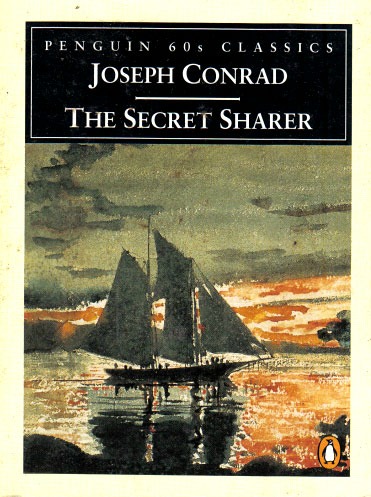
INTERNATIONAL
- Jeff Sparrow
- 30 October 2015
7 Comments
Invoking Joseph Conrad's story about seagoing doppelgangers, 'The Secret Sharer', Edward Said identified Islamophobia as anti-Semitism's respectable twin. Indeed Israeli PM Netanyahu's description of the Mufti urging Hitler onto greater evil contains an echo of the old anti-Semitic canard of Jews as shadowy manipulators. This trope is central to the infamous Protocols of the Learned Elders of Zion, was a key element in Goebbels' propaganda campaigns, and is now central to contemporary Islamophobia.
READ MORE 
-
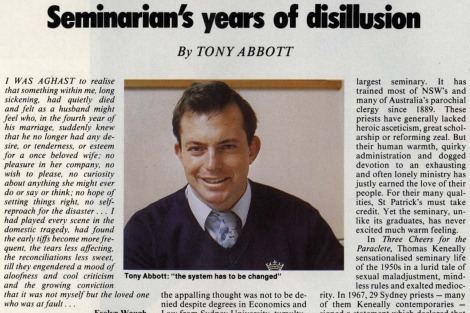
RELIGION
- Michael McVeigh
- 15 October 2015
11 Comments
Many in the Church would echo Tony Abbott's feelings on the dangers a theological environment 'at war with itself' presents to its moral authority. Similarly, there are many conservative politicians and members of the press who look at the current political commentary — marked by discussion rather than authority — and wonder what a government can accomplish in such an environment. Not surprisingly, Cardinal George Pell — described by Abbott as a 'fine human being and a great churchman' — is among those pushing back against the dialogue at the current Synod on the Family.
READ MORE 
-

INTERNATIONAL
- Tony Kevin
- 12 October 2015
6 Comments
'Other countries in response to one mass shooting have been able to craft laws that almost eliminate mass shootings,' said Barack Obama earlier this month. 'Friends of ours, allies of ours, Great Britain, Australia — countries like ours.' Thankfully, America is not like Australia. Though many Australians feel a natural envy for our confident, successful cousin, many disturbing developments — Tea Party style politics, anti-immigrant nativism, know-nothing anti-science — have roots traceable to the US.
READ MORE 
-

- Jenny Te Paa
- 09 October 2015
16 Comments
Thank you Francis, for although you have not spoken at any length about theological education per se — any more than you have spoken about the status of women per se — in spite of these somewhat startling omissions, this indigenous lay woman theological educator feels no less inspired, comforted, reassured, blessed, beyond imagining by your gentle, wise, insistent and prophetic urgings.
READ MORE
-
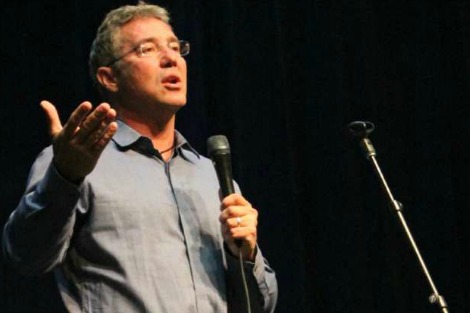
AUSTRALIA
- Andrew Hamilton
- 08 October 2015
25 Comments
Banning people from entering countries has become the flavour of the month. Two US citizens, hip-hop artist Chris Brown and anti-abortion advocate Troy Newman, were banned from entering Australia. It is sometimes right to exclude people. But unless the processes are transparent and the need clearly demonstrated, such exclusion has costly consequences for the life of the community. It privileges power over reflection, and suggests character is defined unchangeably by past behaviour.
READ MORE 
-
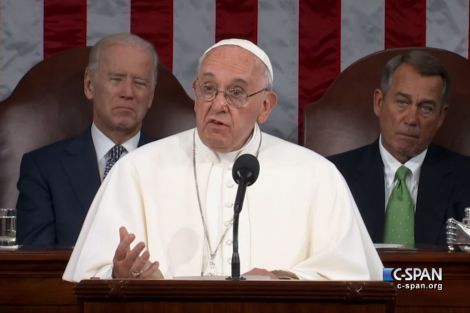
INTERNATIONAL
- Fatima Measham
- 30 September 2015
28 Comments
The only people who regard Francis as radical are those who think popes should only attend to matters of personal conscience. Topics such as abortion and same-sex marriage are safe zones for comment because they don't concern the economic order, or threaten systems that generate wealth for the few. But Francis has smudged the line between faith and economics in a way that many conservatives find inconvenient.
READ MORE 
-

- Frank Brennan
- 18 September 2015
Pope Francis's concerns are not narrowly dogmatic or pedagogical but universally pastoral. He knows that millions of people, including erstwhile Catholics, are now suspicious of or not helped by notions of tradition, authority, ritual and community when it comes to their own spiritual growth which is now more individual and eclectic. He wants to step beyond the Church's perceived lack of authenticity and its moral focus on individual matters, more often than not, sexual. He thinks the world is in a mess particularly with the state of the planet — climate change, loss of biodiversity and water shortages, but also with the oppression of the poor whose life basics are not assured by the operation of the free market, and with the clutter and violence of lives which are cheated the opportunity for interior peace. He is going to great pains to demystify his office. He wants all people of good will to emulate him and to be both joyful and troubled as they wrestle with the probl
READ MORE
-
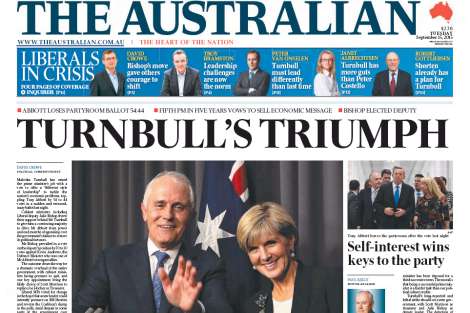
AUSTRALIA
- Tony Kevin
- 16 September 2015
14 Comments
Now is an exciting moment for Australia, after all the low points of the past two years. We can look forward to a real return to greater civil discourse and intellectual integrity in politics. It will be good if the parties can set aside the negative energy that was brought to the Parliament and return to an informed contest of ideas, for there is much to debate.
READ MORE 